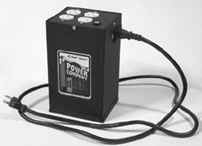Jonathan Scull’s Stereophile Review Of Richard Gray’s Power Company Line Enhancer
| Commentary |
| Clement Perry, Mike Silverton & James Saxon |
| May 2000 |
 I find Jonathan Scull’s review of the Richard Gray’s Power Company 400S line enhancer in the June issue of Stereophile profoundly mean-spirited. My unhappiness has very little to do with the RGPC’s reported failure to demonstrate their worth In Mr. Scull’s setup. I remind the reader that this is the man who recommends the Shun Mook Pucks.
I find Jonathan Scull’s review of the Richard Gray’s Power Company 400S line enhancer in the June issue of Stereophile profoundly mean-spirited. My unhappiness has very little to do with the RGPC’s reported failure to demonstrate their worth In Mr. Scull’s setup. I remind the reader that this is the man who recommends the Shun Mook Pucks.
What disturbs me is Mr. Scull’s attempt to pass off this outrage as an objective report when it’s fairly obvious (in my opinion) that objectivity is the least of the gentleman’s virtues. I still marvel at Scull’s claim that the RGPC 400S “would sound best on a leaner-than-dog’s-breath amplifier.” I recently visited Mike Silverton’s place (Levinson No.33H mono amps, No.39 CD Player, Wilson WATT/Puppy Sixes, with four RGPC’s in the line). Nobody with a set of functioning ears could possibly describe what I heard as anything resembling dog’s breath. This is one of the best two-channel sound systems I’ve lately auditioned. The man also brews a fine cup of coffee.
I guess all the buzz at the recent CES was a lot of noise about nothing much. I also guess that the 22 or so exhibitors using RGPC’s — Audio Research, BAT, VTL, MBL of America, Lamm Audio, Verity Audio, Pioneer Elite, and Harmonic Technology, etc. — experience all those sub-stellar qualities Mr. Scull ascribes to the RGPC. Just imagine, all those folks wanting their room setups to sound less than impressive. No wonder we’re in trouble!
What should offend any reasonable audiophile is Mr. Scull’s lead-in comment about “Audio Line Source [lobbying] hard for a review.” That’s an ugly charge. Here’s what I learned from industry insiders:
Last fall, several large manufacturers and dealers of high-end audio were so impressed by their successes with the RGPC at CEDIA that they made telephone calls to many reviewer friends on the lookout for products to discover. A number of these reviewers requested preview samples with the intention of passing their new-product information to their senior editors once they’d made their personal evaluations. When approached by additional Stereophile reviewers, Audio Line Source did the right thing: they called the senior editor to inquire into the proper procedure. Unfortunately, this secret protocol had already been violated, unknowingly of course. Mr. Scull instructed at least two reviewers to return their units, instructing a third not to accept any additional units for review. Mr. Scull circulated an internal memo instructing all reviewers to clear reviews with him before accepting products from manufacturers. Please note: after the fact.
The above mentioned third reviewer had already participated in an effective audio and video demonstration of the RGPC at The Listening Room in Scarsdale, NY. It was at this demo the reviewer expressed a keen interest in doing a write-up. A reluctant RGPC rep advised him that all requests must go through the senior editor. Subsequently, the reviewer purchased the product for his own use, and since has stated that he really likes what the RGPC does (I’m told to a startling degree) for his system.
The plot thickens. Mr. Scull asked for his own review units. He decided to do the review himself. To repeat: he would not allow any other reviewer to have a shot. The rest, as they say, is history, or if you like, his story. But it’s woefully incomplete. For example, why didn’t Scull allow his reviewer to do the review? Did he simply want to punish an indiscretion? Or (as I strongly suspect) did he want to assist a competitor in making these new guys just go away? The connection to me looks pretty clear: a negative report on the one hand; on the other, in the previous (May) Stereophile, a six-page interview of Paul McGowan and a follow-up feature of his PS Audio Power Plant 300 by John Atkinson, who couldn’t possibly have been sweeter to his subject.
Two knowledgeable ST staff writers find that the RGPC’s make little difference to their systems. It bears repeating: the RGPC’s don’t work identically in every application. Hey, what does? Double hey: if you’re unimpressed by what you hear, they’re returnable. I’d sooner part with a kidney. ST contributors, Dewey Wesley, Lew Lanese, Bill Brassington, Bill Wells and Mike Silverton likewise. Anecdote time again. This one’s a tidy little parable: A dozen or so prospectors stumble across a ton of nuggets and come running into town screaming, “I’m rich, I’m rich!” Most of them go on to purchase beautiful homes, fancy carriages, that sort of thing. You find nothing. Furious, you go to the local newspaper and submit an indignant story about hallucinating prospectors.
Thank goodness for the Internet — Stereo Times for convenient example — as an antidote to venomous assaults. There is gold in them thar hills!
Mike Silverton
I’m periodically reminded why I’ve so little patience for Jonathan Scull — periodically, as in every Stereophile issue in which this gasbag appears. Never mind the stylistic and substantive booberies the man flaunts time after time. These would take forever to cover, and we’ve better things to do. We cut for economy’s sake to Scull’s puzzling pan of an audio component a great many discerning audiophiles, this writer included, view as a success.
Critics, reviewers, journalists, we all express opinions. We approve and disapprove. That’s what folks expect us to do — want us to do. If one fudges this role he abdicates his responsibilities. I don’t take Scull to task for an opinion that runs counter to my own. I condemn him rather for arriving at conclusions so contrary to an informed consensus as to constitute an act of vandalism.
Were Scull a harmless creature, these words from his RGPC review would be merely hilarious: “I’m no engineer. But I’ve met some fascinating people and learned just enough to be dangerous. (To me learning is like music: It keeps you alive.)” It’s highly unlikely that Scull anticipated the irony of this self-inflation aside. Presumably our music-loving knowledge-sponge is unfamiliar with the adage, “A little learning’s a dangerous thing.” Someone needs to remind him that this isn’t flattery.
There are two ways of looking at Scull’s modus operandi. One reads his exquisitely sorted perceptions, his monthly flows of subtleties in characterizing the audible distinctions of this or that piece of (generally upmarket) gear, and one thinks, No mere mortal, he! I’d kill for ears like that! Or one thinks that this is his job. In order to survive, to bring home the bacon, Scull is obliged to discover fresh piles of perceptions lest his fans grow bored. His fans: they exist, alas. One takes comfort in Liberace, whom his fond audience judged a keyboard giant. A wise man remarked that nobody ever went broke overestimating the American public’s vulgarity. Or was that stupidity?
Never mind. Were mere blather Scull’s sin of commission, we would find it in our hearts, or if not there, somewhere, to forgive. Gasbaggery is one thing; untrustworthiness is another. I’ve long questioned Scull’s impartiality. No hard proof; a gut thing. His RGPC review comes close to confirming a standing suspicion. Again, no proof. Yet, to say it again, how does an audiophile-journalist arrive at a opinion so inexplicably distant from a well-informed consensus? I’ve no suggestions. Only questions.
Scullduggery
James Saxon
Jonathan Scull’s lambasting of the Richard Gray’s Power Company in the June issue of Stereophile reads like a spoof of a bad review. However, knowing that satire is beyond the reach of audio’s un-funniest writer, I see his negative review as part of a larger effort on behalf of Stereophile to promote the products of one manufacturer, PS Audio, at the expense of another, Audio Line Source. First, we had John Atkinson’s warm-up interview with Paul McGowan whose phobia about the RGPC is documented at PS Audio’s web site. Then, we have the Roman gladiator spectacle of Scull butchering a worthy product in order to slake the blood lust of readers mewing for a negative report, any negative report. By sacrificing Richard Gray’s product, Scull tries to kill two for the price of one: First, he appeases the grandstand who want to see a thumb’s down massacre, and second, he protects McGowan, whose company is potentially a heavy advertiser, against competition from Richard Gray.
I make the latter accusation on the basis of my own experience with both the PS Audio Power Plant P300 and the Richard Gray’s Power Company. Both products perform “as advertised” in my system, which is to say, unassailably. In fact, I have found that plugging the P300 into the RGPC boosts the performance of line source components connected to the P300 without diminishing the magnificent job the RGPC does with the amplifier. However, it is possible that Scull reported the truth as he heard it. I won’t call the man a liar.
However, I will say Scull overstepped the bounds of professional ethics regarding a negative review. If the Richard Gray’s Power Company is as incompetent as he says it is, I think he should have informed the manufacturer of his findings. Then, he should have given Audio Line Source an opportunity to withdraw the product from review. By committing his hatchet job to print, Scull slashed out at a small manufacturer, dealers with RGPC inventory (such as I), and consumers who may have been frightened away from adding this worthwhile product to their systems. This is not only a breach of publishing standards but may also be actionable in a court of law.
I doubt anyone will be suing over Scull’s skullduggery, but as a “newsstand” dealer in Stereophile, I will return the balance of five unsold and undamaged issues to Emap and decline further representation until Jonathan Scull apologizes or resigns his position.
![]()
Don’t forget to bookmark us! (CTRL-D)
Stereo Times Masthead
Publisher/Founder
Clement Perry
Editor
Dave Thomas
Senior Editors
Frank Alles, Mike Girardi, Key Kim, Russell Lichter, Terry London, Moreno Mitchell, Paul Szabady, Bill Wells, Mike Wright, Stephen Yan, and Rob Dockery
Current Contributors
David Abramson, Tim Barrall, Dave Allison, Ron Cook, Lewis Dardick, Dan Secula, Don Shaulis, Greg Simmons, Eric Teh, Greg Voth, Richard Willie, Ed Van Winkle, and Rob Dockery
Music Reviewers:
Carlos Sanchez, John Jonczyk, John Sprung and Russell Lichter
Site Management Clement Perry
Ad Designer: Martin Perry





Be the first to comment on: Jonathan Scull’s Stereophile Review Of Richard Gray’s Power Company Line Enhancer